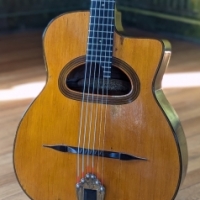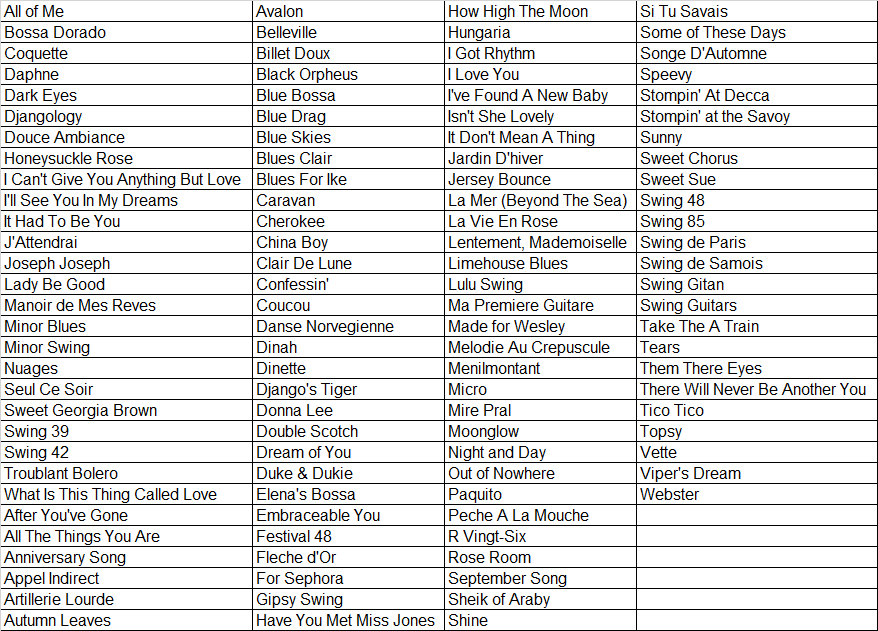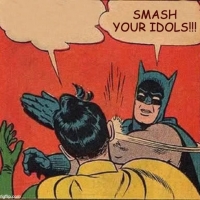DjangoBooks.com
Welcome to our Community!
Categories
- 20K All Categories
- 1.1K General
- 485 Welcome
- 60 Archtop Eddy's Corner
- 147 CD, DVD, and Concert Reviews
- 385 FAQ
- 26 Gypsy Jazz Italia
- 27 Photos
- 209 Gypsy Picking
- 21 Unaccompanied Django
- 15 Pearl Django Play-Along Vol.1
- 17 Gypsy Fire
- 45 Gypsy Rhythm
- 1.4K Gypsy Jazz University - Get Educated
- 131 Gypsy Jazz 101
- 231 Repertoire
- 228 History
- 709 Technique
- 51 Licks and Patterns
- 6 Daniel Givone Manouche Guitare Method Users Group
- 20 Eddie Lang Club
- 1.3K Gypsy Jazz Gear
- 816 Guitars, Strings, Picks, Amps, Pickups and Other Accessories
- 465 Classifieds
- 52 Recording
- 64 Other Instruments
- 18 Violin
- 5 Mandolin
- 23 Accordion
- 7 Bass
- 11 Woodwinds
- 352 Gypsy Jazz Events
- 145 North America
- 112 Europe
- 95 International
In this Discussion
Learning The Changes Of 100+ Songs - Is It Worth It or Just a Waste of Time?
 geese_com
Madison, WINew 503
geese_com
Madison, WINew 503
This might sound like a crazy idea, but I decided that I wanted to try and learn the changes to as many songs as I can. Part of the motivation is to be able to participate in jams (if only just by playing rhythm) and to also just know a bunch of songs. I play at a weekly jam, at home, and I am planning on going to Django in June this year.
Right now I have a list of about 100 songs. I started with the 24 recommended from the DiJ site, then I added songs from DiJ compilation book, and then added some songs that I like.
I started this endeavor about a month ago and knew around 20 songs comfortable well. As of today, I am comfortable with about 60 of them.
Here's the list so far. If you think I am missing any songs I should learn, please free to offer up suggestions.
What are your thoughts? Does this sound like a crazy waste of time?
Thanks!











Comments
It’s an excellent list that will get you through any jam. Throw in the changes to a couple of waltzes and you will be the toast of Django in June
I personally only learned the songs that:
A) I liked
B) everyone was playing, so that I wouldn't be left out
Before you knew it , I had memorized a bunch of tunes, and from having learned a bunch of tunes , my ears got used to hearing certain changes, and so when I have to learn a new tune in the style, quite often, it isn't a problem. For instance, if you really have All Of Me and Minor Swing in your ears. Anniversary song shouldn't be a problem. If you have Daphne in your ear, the A section of Belleville shouldn't be a problem. If you've learned I can't give you anything but love, django's tiger, shine.. then the last 8 of My Melancholy baby is easy.. And so on and so forth!
You can do it Gian!
www.denischang.com
www.dc-musicschool.com
I did a similar thing a few years ago. Mostly it was because of Django in June. I wanted to be able to jam without the iReal or a paper chart. Way more fun when you can play the changes without giving it much thought only making sure to keep the tempo and have a good sound. Then you can listen to the others play and really have fun interacting. As Dennis mentioned it became much easier to learn a new song the more I got into it. You should be seeing that by now. The only problem becomes maintenance. My list is at about 130 songs but I'd need to brush up on a lot of them before I could put the chart away again. Good news is a lot of times I can do it by ear or if I can't catch a change then going through the chart once is usually what's needed. I had a simple rule what new songs to learn, if it's called in the jam and I don't know it, I put it on "to learn" list.
Which waltzes would you recommend? I am working on Montagne Sainte-Genevieve but that is mostly for my own personal enjoyment.
In 2019, I kept track of all the songs that were called during our jams. The ones that were called most often were added to the list above so that I can just have them memorized.
I am noticing that I can start hearing certain changes. It is also interesting seeing all the same chord progressions in different songs. It sure makes it easier to learn and memorize them.
Thanks for the encouragement, @dennis!
This is exactly part of my motivation as well. I would like to participate in jams even if I am not that good of an improviser. It is a completely different experience playing along versus just watching from the side. You are just more "in tuned" with the music if you are part of it.
I have a ranking system of how I learn the songs that I stole from a blog post I read (http://thewoodshedmusic.com/2015/01/300-tunes-to-know-prioritized-categorized-and-organized/).
A = I know it cold, it’s a part of me.
B = Proficient – I know the tune pretty well, but I have to think a little bit.
C = I might be able to get by playing the tune on a gig, but I’ll rely heavily on my ear.
D = Don’t Know – I don’t know the tune
I keep track of everything in a Google spreadsheet.
I also have several YouTube playlists that correspond to each letter and then a playlist that has all the songs I want to learn. I like to test whether I know the songs by having the playlist play randomly and testing whether I can recall the changes and play along with the song.
I'm way too lazy and unfocused to undertake a project like this, but I have managed to learn (by repetition and accretion) a whole bunch of patterns that are the building blocks of the swing/standards repertory. In fact, one of my teachers long ago gave out a list of nine iconic tunes that contained most of the patterns one might encounter--blues, Rhythm changes, and a bunch of familiar Tin Pan Alley numbers. (The notebook with the whole list is buried somewhere, but in the intervening years I've absorbed most of them anyway.) The trick is recognizing the family traits even when they're in different keys or with slightly altered parts.
That meshed nicely with my experience of disorganized learning-by-accretion--once I'd gotten "Bye Bye Blues" under my fingers and understood how to play it in two or three different keys, I realized that parts of that pattern were all over the repertory. Same thing with "Ain't Misbehavin'" and "Moonglow." I call it the sub-assembly model of song construction. It does get more difficult with post-WW2 compositions, which often depart from the conventions--or with a composer like Jerome Kern, who loves to throw in unexpected harmonic moves.
Learning tunes is absolutely the best thing you can do.
Also, keep in mind, no matter how many tunes you know, somebody's always gonna call one you don't (or draw a blank on in the moment)
It's written in the stars. And you feel like a dummy for a minute, and you move on.
Great choice. I did a similar thing years ago and it was the best thing I could do. What I did not do was learn it in a few keys. This isn't really an issue for GJ style until you start incorporating singers. However, the real benefit if learning a tune in at least 4 keys is that you start to hear what Russell is talking about above and it will start to become easier to learn songs. Good luck.
Waltzes - Montaigne, Chez Jacquet, Indifference are the most common. Lots of people learn the leads but many don’t learn the changes so if you have the chords down there will probably be a queue of players eager to show off their waltzing chops.
Yeah just keep learning the ones you like and eventually it becomes easier to pick them up.
@Russell Letson - laziness is exactly the reason I memorized tunes - I hate carrying books, and you can’t have your eyes and ears attending to other players if they are glued to a book.
And you hit the nail on the head: I counted 30 of the tunes on @geese_com list that follow maybe 5 forms. It’s not an insurmountable task - as you learn basic forms, you’ll find you’ve developed this skill and will learn other unique forms quickly.